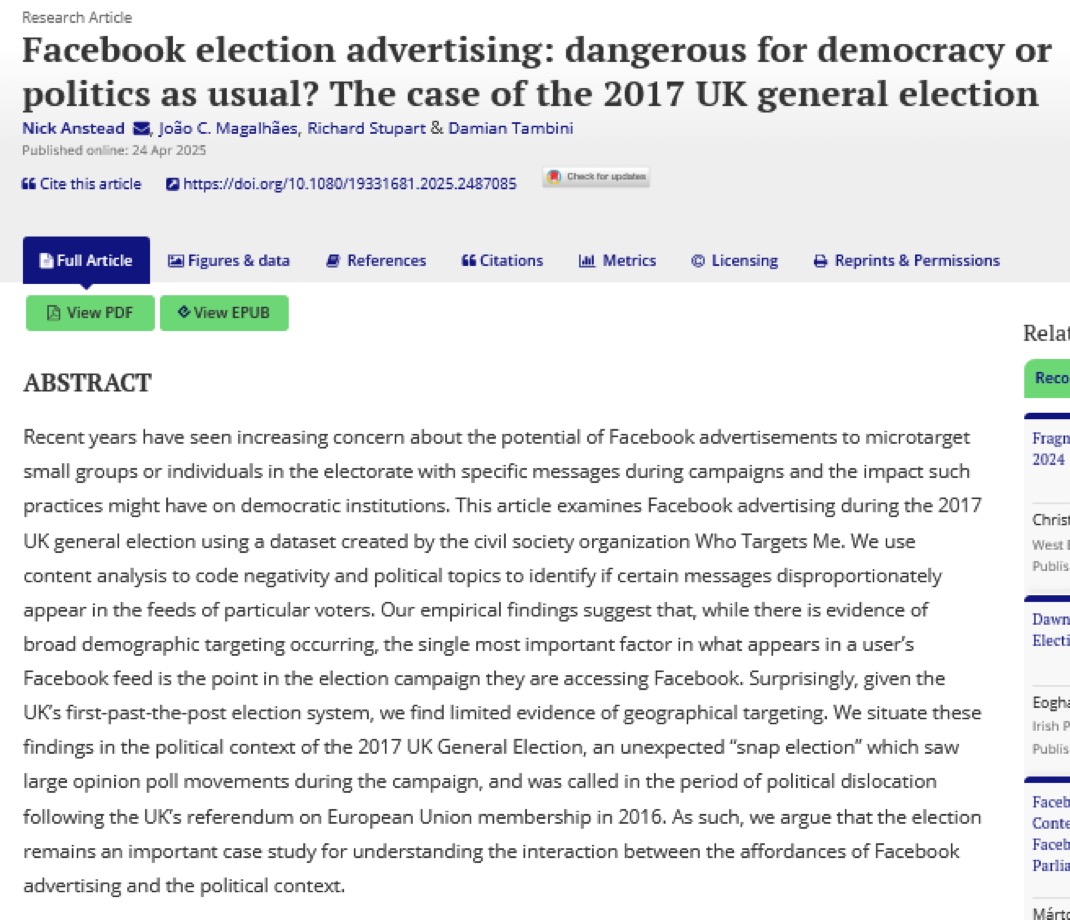Sometimes with academic writing, the best laid plans do not work out as you expect. This is very much the case with an article I have just had published with my brilliant colleagues Damian Tambini, João Magalhães and Richard Stupart.
The article draws on a dataset that we built working with the civil society group Who Targets Me during the 2017 UK general election. Who Targets Me had developed a plugin which harvested Facebook adverts which users encountered as they browsed the platform. The dataset was both huge (over 16k political adverts) and fascinating. Furthermore this was on an era before the launch of the Meta as library, so the data we were working with was really unique. We were progressing pretty smoothly to publication in early 2020. It was then – as it did for so many people in HE around the world – that COVID completely derailed everything, and the article ended up a very long way down our collective to do lists.
For various personal reasons, it was to be years before we returned to the dataset. But we are delighted that, after a re-write and an update, the article has now been published on the Journal of Information Technology & Politics.
The reviewers at JITP were brilliant and encouraged us to bring it the fore the contemporary value of our analysis, even though the events of 2017 might now seem to have receded both into the political and technological past. The full article is available open access but here are five takeaways, both in terms of the value of the case study but also our empirical findings.
- As noted above the Who Targets Me dataset from 2017 is unique, as it details an election which predates the creation of the meta ad library. If we want to understand Facebook advertising in this election, the Who Targets Me dataset remains the only way to do it.
- The UK election of 2017 remains an interesting case study, as it has specific political characteristics which make it different from subsequent elections. It was a snap election, called unexpectedly. It took place at a time of extreme political instability, due to electoral realignments which had been generated or at least catalysed by the EU membership referendum in June 2016. Finally, the formal campaign period itself actually saw significant movements in opinion polls, with Labour closing a 20+ point Conservative lead on the day the election was called to a much smaller 2.4 point actual vote lead on polling day. The question therefore is how do these unusual political circumstances interact with the capabilities and practices of Facebook advertising?
- Overall, our analysis of the 2016 dataset found mixed evidence for how FB advertising was being used: some was certainly being targeted at individuals with certain characteristics – men were more likely to see negative adverts from the Conservatives, for example, while Labour negative adverts were targeted at older voters. But we also found that the biggest driver of what people were seeing on their feeds from political parties was not their personal characteristics but was instead the day of the campaign (although in terms of negativity, this relationship actually varied across the two major parties – Labour’s campaign got more negative over time, the Conservatives less so).
- We also find mixed evidence on the fear that parties will abuse the privacy and lack of accountability afforded on users Facebook feeds to push messages they would not place in a more public forum. The Conservative campaign was very similar on both television and Facebook, focusing on making a Brexit deal. Labour’s campaigns on TV and FB both focused heavily on public services. However, there were differences. The Conservative campaign on FB was much more negative than were its public election broadcasts. Labour’s FB adverts almost ignored the issue of Brexit all together. However, with a high level of public scrutiny, this silence was simply not possible in their PEBs.
- Finally, we would make the case for the continuing value of data-gathering approaches similar to those used by Who Targets Me, even in the age of the ad library. Independent data-gathers like Who Targets Me remain the only form of verification we have for resources like the ad library (and some evidence suggests that officials archives might not be complete). Furthermore, as the loss of the Twitter API and CrowdTangle demonstrate, official data resources that researchers rely on can rapidly disappear. Therefore keeping civil society controlled routes to doing platform research available is vital.
Full citation: Anstead, N., Magalhães, J. C., Stupart, R., & Tambini, D. (2025). Facebook election advertising: dangerous for democracy or politics as usual? The case of the 2017 UK general election. Journal of Information Technology & Politics, 1–18. https://doi.org/10.1080/19331681.2025.2487085
